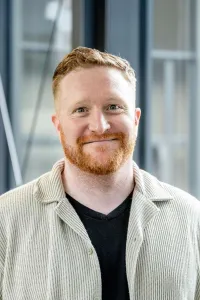What made you choose this degree programme?
I discovered this program through a former colleague while working on my bachelor's thesis at a company developing stem cell therapeutics. The field fascinated me with its potential to treat previously incurable diseases and possibly extend human longevity. I was captivated by stem cells' complex regulatory mechanisms and their interactions with their environment. What truly convinced me was realizing these therapies weren't science fiction anymore, instead they are already being developed for market. Whether allogenic or autologous, stem cell therapies represent the future of medicine, and I wanted to join this emerging field as various therapeutics are currently going through clinical trial or gaining approval which would increase the demand for these specialized skills.
In which respect have or haven’t your expectations been fulfilled?
I expected to deepen my understanding of stem cell biology and their significance in nature, from embryonic development to therapeutic applications. My stem cell physiology course revealed how intricate and controlled the development process is, with complex feedback loops guiding what seems like a natural process but is actually incredibly strategic and self-regulating. My appreciation for stem cells has become more nuanced, revealing complexities I hadn't previously considered, which gives me a different perspective on therapeutic applications. While the program provides excellent coverage of stem cell biology and techniques, I've found that for specialized skills like bioinformatics, personal initiative is needed to connect with specific labs for additional training beyond the core curriculum.
Which aspect of your degree programme do you enjoy most?
I'm fascinated by the entire spectrum of stem cell biology, from their fundamental role in creating and maintaining living organisms to their therapeutic potential. I'm particularly excited by growing evidence supporting stem cell therapies for heart disease and neurodegenerative conditions. As I progress through my second semester, I'm still exploring different specializations, but I'm particularly interested in developing analytical techniques for assessing cell quality and mastering cultivation methods for different cell types. The field's rapid evolution means there's always something new to discover, which keeps me engaged and motivated.
What has been your biggest challenge to date?
The program offers an appropriate level of challenge that rewards dedicated study time. While I haven't encountered major obstacles so far, the learning curve requires consistent effort to truly master the biology of stem cells and the techniques for their cultivation and analysis. The balance of theoretical knowledge and practical application provides a comprehensive education without being overwhelming. The key to success has been maintaining disciplined study habits and actively engaging with the material.
What would you like to become after completing your degree?
While I haven't made a definitive decision yet, I'm drawn to the pharmaceutical industry, particularly as stem cell therapeutics gain momentum. I aim to contribute to developing treatments for diseases once considered incurable. This program provides the specialized skillset that complements my bioengineering background, positioning me to make direct contributions to these innovative therapies. I'm considering pursuing a PhD later, depending on how my interests develop and what opportunities arise. My previous internship during my bachelor's provided valuable industry connections, and I'm continuing to build my professional network alongside my academic development.
Which advice would you like to give to students who consider enrolling in this degree programme?
A genuine passion for stem cell biology is essential before entering this field, as is clarity about whether you're more interested in academia or industry. Maintaining an open mind and exploratory attitude is beneficial since we're constantly learning more about the complex systems governing stem cells. I recommend establishing close relationships with professors and engaging with them frequently, as they are invaluable resources for clarifying concepts and exchanging ideas. Additionally, seek opportunities beyond the curriculum, whether through lab rotations, seminars, or independent projects, to deepen your understanding and develop specialized skills that align with your career goals.




